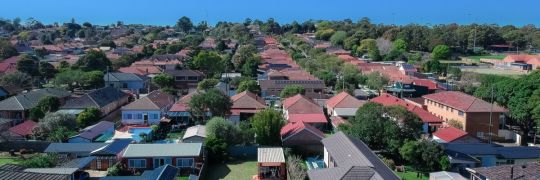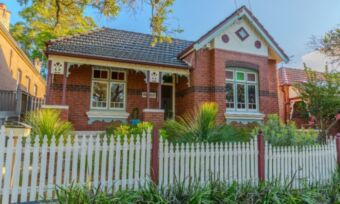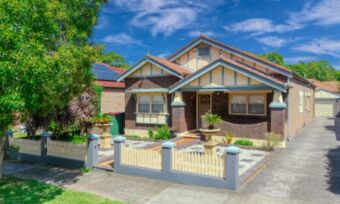First Home Owner Grant (FHOG) NSW

Saving to buy a first home is a significant undertaking. It can take time to build a deposit, and every extra bit of cash can take you a step closer to your goal of buying a place of your own. If you’re looking to buy in New South Wales (NSW), it may be helpful to know about the state’s First Home Owner Grant, a potential source of financial support to help you get into the market sooner.
NSW first home buyers grants and other support: What’s available?
Eligible first home buyers in NSW may have access to support from the state government in the form of the First Home Owner (New Homes) Grant, which provides a lump sum payment towards the cost of buying a home in certain circumstances, and the First Home Buyer Assistance Scheme, which can provide a concession rate or full exemption to the transfer (stamp) duty a first home buyer in NSW would otherwise need to pay.
If you think you may be eligible for first home buyer help in NSW, or you want to apply for a first home buyers grant in NSW, it’s important to understand how the support programs work and what criteria you will need to meet to be able to apply.
How much is the First Home Owner Grant in NSW?
A $10,000 First Home Owner Grant (FHOG) is available in NSW, but only for people who buy or build a brand new home, including homes bought off the plan. Price limits apply for your first home to be eligible. You can pay up to $600,000 for a newly built house, townhouse, apartment or unit.
Or, if you buy vacant land and build a brand new home, the combined cost of land plus building cannot exceed $750,000 to be eligible for the First Home Owners Grant in NSW.
The First Home Owners Grant in NSW may also be available if you buy an established home that has been substantially renovated. This means the home has had a major overhaul, where most of the building has been removed or replaced – and you must be the first person to live there since the renovations. As with new homes, the purchase price cap for substantially renovated ones is $600,000.
Only one First Home Owners Grant NSW is payable in NSW, even if you buy as a couple.
Am I eligible for the First Home Owner Grant in NSW?
Price limits apply to your first home in order to be eligible for the First Home Owner Grant in NSW. But other conditions apply too:
- Each applicant must be at least 18 years old.
- At least one buyer must be a permanent resident or Australian citizen.
- You or your spouse, partner or co-buyer cannot previously have owned a home before 1 July 2000, or received a First Home Owner Grant in Australia at any time.
In addition, you need to live in the home for at least six continuous months within a year of completing construction or taking ownership of your first home.
You could still be eligible for the First Home Buyers Grant in NSW if you have owned an investment property after 1 July 2000, as long as you never lived there yourself for six months or more.
How to apply for the First Home Owner Grant in NSW
There are two ways to apply for the First Home Buyers Grant in NSW.
- If you need the Grant to settle on your first home, or to fund the first progress payment on a new build, the NSW Government says you’ll need to lodge your application for the First Home Owner Grant through your home loan lender, who must be an ‘approved agent’. The government provides a list of approved agents for the FHOG on its website.
- If you’ve already completed the purchase or construction of your first home, you can lodge your Grant application online through the NSW State Revenue Office.
Either way, you’ll need to lodge an application for the FHOG within 12 months of settling on your new home or of construction being completed.
Are first home buyers in NSW exempt from stamp duty?
Along with the First Home Owner Grant, first home buyers in NSW may be eligible for savings on stamp duty – now known as ‘transfer’ duty. These savings are made available to eligible buyers under the First Home Buyers Assistance Scheme (FHBAS).
Through this scheme, you may be entitled to a full or partial exemption on transfer duty, as long as your first home is valued at no more than $800,000. Unlike the FHOG, the FHBAS is available to people buying new or existing homes. Let’s take a closer look at how it works.
Buying vacant land
If you buy vacant land, you can pay zero transfer duty if the block is valued below $350,000. A concessional (reduced) rate of duty applies if the land is priced between $350,000 and $450,000.
Buying a new home
You can be eligible to pay zero stamp duty if you buy a brand new home valued below $650,000. You may still be eligible for a concessional rate of duty if a new home is valued between $650,000 and $800,000.
Buying an existing home
If you choose to buy an established home, you can pay zero transfer duty if the property is valued below $650,000. Savings can still be available via a concessional rate of duty if the home is valued between $650,000 and $800,000.
Remember though, the First Home Owner Grant in NSW is only available on new homes worth up to $600,000, or up to $750,000 (home plus land combined) if you buy vacant land and build a home on it. Unlike the FHBAS, you can’t get the FHOG on an existing home unless it’s been substantially renovated by the seller. This means that when deciding where to buy or build your first home, it could be worth thinking about the option that helps you maximise the available benefits.
How do you buy your first home?
The home buying process can seem daunting the first time around – particularly in NSW where property prices can be higher than in other parts of Australia – but it’s often more straightforward than it can appear. An important starting point is to work out your buying budget, including how much money you can afford to borrow. This is when it can help to speak with a lender, mortgage broker or professional financial adviser.
Once you understand how much you can borrow, you will likely have a clearer picture of what you can afford to pay for your first home, and this should help narrow down your choice of properties.
When you’ve found a home you want to buy, you should have the contract of sale checked by your solicitor, and arrange a pre-purchase building and pest inspection to be sure the building is sound.
From here, you can make an offer to the selling agent if the property is being sold by private treaty, or bid at auction.
Once your offer is accepted, or if you’re the highest bidder at auction, you may be asked to pay a deposit, and you and the seller each sign a copy of the contract of sale. This is a process known as ‘exchange’.
From here, what follows is a settlement period, which usually lasts around six weeks in NSW. This is where your solicitor or conveyancer organises the legal transfer of the property out of the seller’s name and into yours. This is also the time to get your home loan finalised.
Once settlement day arrives, you’re handed the keys to your new home, your home loan begins and you’re ready to settle in!
The comparison rate for all home loans and loans secured against real property are based on secured credit of $150,000 and a term of 25 years.
^WARNING: This comparison rate is true only for the examples given and may not include all fees and charges. Different terms, fees or other loan amounts might result in a different comparison rate.
 Owner occupied
Owner occupied
 20% min deposit
20% min deposit
 Redraw facility
Redraw facility
 Owner occupied
Owner occupied
 20% min deposit
20% min deposit
 Redraw facility
Redraw facility
Canstar may earn a fee for referrals from its website tables, and from Sponsorship or Promotion of certain products. Fees payable by product providers for referrals and Sponsorship or Promotion may vary between providers, website position, and revenue model. Sponsorship or Promotion fees may be higher than referral fees. Sponsored or Promoted products are clearly disclosed as such on website pages. They may appear in a number of areas of the website such as in comparison tables, on hub pages and in articles. Sponsored or Promoted products may be displayed in a fixed position in a table, regardless of the product’s rating, price or other attributes. The table position of a Sponsored or Promoted product does not indicate any ranking or rating by Canstar. For more information please see How We Get Paid.
Main image source: Elias Bitar/Shutterstock.com.
This article was reviewed by our Sub Editor Tom Letts before it was updated, as part of our fact-checking process.

Alasdair Duncan is Canstar's Deputy Finance Editor, specialising in home loans, property and lifestyle topics. He has written more than 500 articles for Canstar and his work is widely referenced by other publishers and media outlets, including Yahoo Finance, The New Daily, The Motley Fool and Sky News. He has featured as a guest author for property website homely.com.au.
In his more than 15 years working in the media, Alasdair has written for a broad range of publications. Before joining Canstar, he was a News Editor at Pedestrian.TV, part of Australia’s leading youth media group. His work has also appeared on ABC News, Junkee, Rolling Stone, Kotaku, the Sydney Star Observer and The Brag. He has a Bachelor of Laws (Honours) and a Bachelor of Arts with a major in Journalism from the University of Queensland.
When he is not writing about finance for Canstar, Alasdair can probably be found at the beach with his two dogs or listening to podcasts about pop music. You can follow Alasdair on LinkedIn.
- NSW first home buyers grants and other support: What’s available?
- How much is the First Home Owner Grant in NSW?
- Am I eligible for the First Home Owner Grant in NSW?
- How to apply for the First Home Owner Grant in NSW
- Are first home buyers in NSW exempt from stamp duty?
- How do you buy your first home?
The comparison rate for all home loans and loans secured against real property are based on secured credit of $150,000 and a term of 25 years.
^WARNING: This comparison rate is true only for the examples given and may not include all fees and charges. Different terms, fees or other loan amounts might result in a different comparison rate.

Up to $3,000 when you take out a IMB home loan. Minimum loan amounts and LVR restrictions apply. Offer available until further notice. See provider website for full details. Exclusions, terms and conditions apply.
 Owner occupied
Owner occupied
 20% min deposit
20% min deposit
 Redraw facility
Redraw facility
Try our Home Loans comparison tool to instantly compare Canstar expert rated options.





